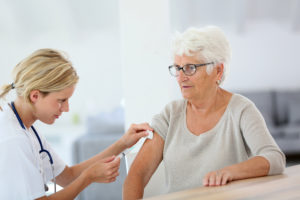The Shingles Vaccine. Who Needs it and Why it’s Important.
 Shingles is a painful skin condition that can lead to more significant health complications or take you out of commission at work and home for up to several weeks. The risk of contracting shingles increases with age. Older adults, in particular, should understand their risk factors and the benefits of protecting themselves with a vaccination.
Shingles is a painful skin condition that can lead to more significant health complications or take you out of commission at work and home for up to several weeks. The risk of contracting shingles increases with age. Older adults, in particular, should understand their risk factors and the benefits of protecting themselves with a vaccination.
Who Should Obtain the Shingles Vaccine?
The Centers for Disease Control and Prevention (CDC) recommend that adults age 60 and older should obtain a shingles vaccine (brand name Zostavax®) whether or not they have had chickenpox. Zostavax mitigates the risk of developing shingles by 51 percent. There is no maximum age at which the CDC recommends adults not obtain the vaccine.
Are There Different Forms of the Vaccine?
To further protect older adults from both shingles and postherpetic neuralgia (PHN), a painful viral infection and chronic condition that can follow a shingles infection causing a mildly itchy to intensely painful rash, the CDC recommends the Shingrix (recombinant zoster) vaccine. Since 2017, the CDC recommends that healthy adults age 50 obtain the Shingrix vaccine as the preferred method of vaccination against both Shingles and PHN.
How is the Shingles Vaccine Administered?
Zostavax is given in a one-dose shot in doctor’s office or pharmacy, and protection lasts about five years. Shingrix is dispensed in two one-dose shots two to six months apart in a doctor’s office or pharmacy.
Should Adults who have Previously Been Infected with Shingles Receive a Vaccine?
Yes. Just like with influenza, even if you have had a previous shingles infection, continue to receive a shingles vaccine if you are 50 years old or older to mitigate your chances of future infection. If you have had a recent shingles diagnosis, as long as the shingles rash has disappeared, you can get vaccinated, as there is no specific recommended wait time in between an infection recovery period and a vaccination.
Who Should Not Get the Shingles Vaccine?
Talk to your doctor if any of the following complication risk factors apply to you:
- A life-threatening or severe allergic reaction to gelatin, the antibiotic neomycin, any other component of the shingles vaccine, or any other severe allergies.
- A weakened immune system due to HIV/AIDS or another autoimmune system condition.
- Treatment with drugs that affect the immune system, such as chemotherapy, radiation, or steroids.
- You are currently pregnant or may become pregnant, as women should not become pregnant until at least four weeks after receiving the shingles vaccine.
- You have a moderate or severe acute illness resulting in a temperature of 101.3° F or higher. Talk to your doctor and wait until you have fully recovered to be vaccinated.
How to Obtain the Shingles Vaccine
If you would like to obtain the shingles vaccine or have any questions as to whether or not vaccination is right for you, talk to your doctor. He or she can discuss your risk factors and the options available to you to reduce your risk of contracting this painful condition.
More